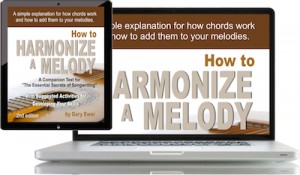We tend to think that the only people with any measure of musical ability are the ones that have a special gift for it. And while being a good musician requires a bit more than a passing understanding of how music works, musicianship is something that comes with being human. It’s in our DNA.
The kind of musicianship I’m talking about has more to do with processing music than writing it. Most people have the ability to hear and enjoy music, and that requires a brain that is able to take the notes and rhythms they’re hearing and make sense out of them.
 “The Essential Secrets of Songwriting” eBook bundle comes with a free copy of “Creative Chord Progressions”. Learn how to take your chords beyond simple I-IV-V progressions. With pages of examples ready for you to use in your own songs.
“The Essential Secrets of Songwriting” eBook bundle comes with a free copy of “Creative Chord Progressions”. Learn how to take your chords beyond simple I-IV-V progressions. With pages of examples ready for you to use in your own songs.
For some, however (and I assume you’re one of them), musicianship extends to being able to create music from the imagination. You are one of the ones who derives pleasure from pulling many different song elements together to create a unique musical journey — a new song.
But lately, perhaps, you’ve found that everything you try to write has a great start, and a nonexistent finish. You get a certain way into the writing of a new song, and then everything fizzles, and you have no ability to finish what you’ve started. So now you have many — maybe dozens — of attempts, with nothing completed to show for your efforts.
And that makes you wonder: am I really a songwriter? Maybe I’m just someone who gets excited by the thought of songwriting, but lacks the ability to actually see it through to completion.
The good news is that you probably are a songwriter. People who have little ability to write music probably wouldn’t get as excited as you do at the start of your songwriting process.
If you find it easy to start but hard to finish a song, here are 3 common causes, along with suggestions for overcoming those problems.
1. Not Fully Understanding Song Structure
If you find that you get 1 or 2 minutes into a song that’s going well, and then you get stumped because you don’t know what should happen next, that’s quite possibly the symptom of not really understanding how songs are designed.
Solution: Take some time to read good songwriting texts, and to do some online reading by other good songwriters who like to describe their process. A song is a musical journey that uses a kind of musical logic. And while every song is unique, it’s very possible to generalize in a meaningful way how songs should unfold. Knowing what should happen next means understanding song form and structure.
2. Feeling Uninspired to Write
Perhaps it’s not so much that you can’t think of what’s “supposed to happen next.” Maybe it’s more that you just don’t feel the same excitement for your song that you felt when you started it.
Solution: To keep your excitement levels up, listen to good music. Listening to a great song has a way of generating creative and artistic excitement, because you hear the possibilities! And don’t just listen… when you hear something that you really like, try to pinpoint exactly what it is that excites you. By identifying what you like, you’re more able to do something similar in your own music. So you not only inject a bit of excitement into your process, but you’re able to use it in a practical way.
3. Your Songs Have Too Many Ideas
It often surprises even good songwriters how much repetition goes on within a good song. Many verse and chorus melodies take a short 1- or 2-bar idea which gets repeated over a changing chord progression. So if you find that you get 2 bars into a verse melody and don’t know what to do next, your excitement for the song fizzles quickly.
Solution: Create a short, catchy idea, and then sing it over and over again with the chords changing underneath. You’ll find that you can quickly create an entire verse, or half a verse, with very little effort:

That’s an AAAB form (3 phrases the same, and the last one different), and you can modify that plan to many other possibilities: ABAB, AABA, and so on.
All I really want to convey is that song structure can simply be laden with too many ideas. Simple is often better than complex. So if you’re stuck for ideas, simply repeat the one you’ve already created.
So most cases of “unfinished song” syndrome can be solved by:
- more fully understanding how good songs are structured;
- replenishing your musical excitement by listening to good music; and/or
- simplifying your songs’ designs.
No matter what happens to your song, don’t throw it out. Because you’ll be surprised by how many ideas will come flooding back into your musical brain by simply putting the song away and bringing it out again another day.
Have patience, and don’t get discouraged!
 Written by Gary Ewer. Follow Gary on Twitter.
Written by Gary Ewer. Follow Gary on Twitter.
 Once you’ve got a melody, how do you know which chords will work with it? “How to Harmonize a Melody” shows you how to do exactly that. Shows the secrets of harmonic rhythm, identifying the key of your melody, chord function, and more. It’s part of “The Essential Secrets of Songwriting” 10-eBook Bundle.
Once you’ve got a melody, how do you know which chords will work with it? “How to Harmonize a Melody” shows you how to do exactly that. Shows the secrets of harmonic rhythm, identifying the key of your melody, chord function, and more. It’s part of “The Essential Secrets of Songwriting” 10-eBook Bundle.










